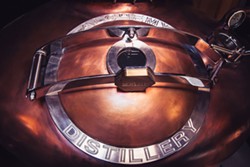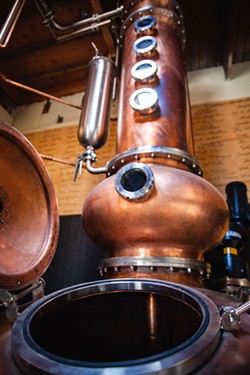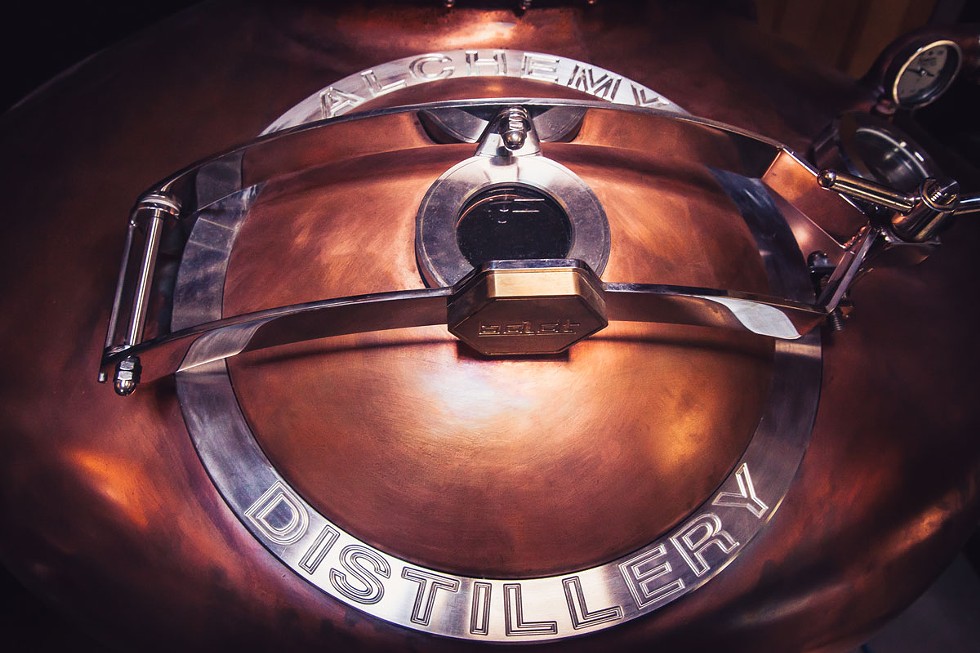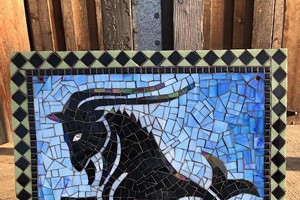Does it take a village to make whiskey? For the owners and operators of Alchemy Distillery, community collaboration and a commitment to the environment have coalesced into an intoxicating beverage.
Amy and Steve Bohner are known for building things. Steve (short cropped hair and a belly-length beard with lightning bolts of gray) and Amy (a shock of tight, copper curls) have run Alchemy Construction, a company recognized for sustainability, for more than 20 years, and are fixtures at local baseball games and rock shows.
Their background in construction and environmentalism gave them a solid foundation for establishing Alchemy Distillery, where they've been moonlighting as whiskey makers since 2015.
Sustainability informs much of what they do. "It's who we are — in our personal life too," Amy says. "When we were starting our distillery, it made sense to use the same philosophies."
In trainings, workshops and classes around the country, they learned how to build a distillery, how to develop a recipe, how to run a still. Everyone talked about "grain to bottle" but they also relied on major grain distributors from the Midwest. So the first step in crafting sustainable whiskey, she says, was finding a local source of grains.
The Bohners turned to their community connections, trying to locate local growers who could supply them with the raw ingredients they needed to get started. They found willing partners in Laurence and Lisa Hindley, and John Laboyteaux, who farm in the Mattole Valley and near Avenue of the Giants, respectively. The only problem? They grew grains pretty much exclusively for local bread and pastry maker Beck's Bakery and didn't want to damage that relationship.
Amy then reached out to Beck's owner Rhonda Wiedenbeck, quickly securing her blessing. "Rhonda, who's now one of my favorite people in the whole world, taught us so much," Amy says.
The Bohners started by using whatever grains didn't work for Wiedenbeck. Now they collaborate with the growers during planting season to decide exactly which grains they want for that year's product line. Alchemy Distillery remains the first and only Humboldt distillery to make whiskey from local organic grains, Amy says. With no middleman and no need for transportation, this cuts costs and carbon emissions while supporting local farmers.
Their commitment to the community and environment shows up in other ways, too. For example, their cooling system is a self-contained, 3,000- gallon water tank that saves them from having to run municipal water for eight-hour distilling or mash sessions. That tank, incidentally, came from their neighboring scrapyard, another example of creative reuse and community collaboration. Alchemy's spent mash is also shipped out to local pig farms as feed. You can keep up to date on how many tons of mash are piggy-bound at the distillery, where the number is etched on a chalkboard (More than 30,000 gallons so far).
Perhaps their most famous eco-innovation is a whiskey made from day-old bagels, which was inspired by a U.K. brewery that brewed beer from stale toast.
Amy reached out to local bakers and delis but found (in true Humboldt fashion) that they either baked just enough product to sell that day or didn't use preservatives, meaning the baked goods would mold before they would go stale. However, Humboldt County bagel maker Los Bagels, also known for sustainable and organic foods, was on board.
Then it got really fun, Amy says. After several weeks of nearly burning out the motor in their kitchen food processor, she decided to go Coen Brothers and buy a wood chipper. The chipped bagels made up the mash, which they fermented and distilled into a whiskey that's been aging in barrels for two years now.
"We've slipped it into tasting flights and nobody could tell it was different than our grain whiskeys," Amy says. They plan to release it around Hanukkah this year.
The Bohners don't necessarily want to become "quirky" whiskey makers, but they've got a few more tricks up their sleeves. They plan to release an apple brandy in April, a collaboration with Arcata's Wrangletown Cider Co. They also distilled an absinthe with Wrangletown owner Pat Knittel, but it's still under review by the FDA. (The government shutdown delayed that process. Sigh.)
Recently, their line of whiskeys called Cereal Killer — a trio made from wheat, rye and a wheat-rye hybrid called triticale — all won medals in American Distilling Institute's annual judging.
Alchemy's whiskeys can be found locally in bars, restaurants and stores wherever liquor is sold. Stop by the distillery on the second Friday of each month from 6 to 9 p.m. during Arts! Arcata. You can taste their products (with reusable glass straws), take a tour and play a game in which you identify the 20+ green innovations in the distillery. (Hint: Amy even sewed the cloth hand towels in the bathroom.)
You can earn a prize, Amy says, "but even more exciting ... is people learning about the ways we're sustainable." That's the spirit.
Comments
Showing 1-1 of 1










